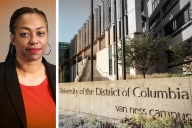You have /5 articles left.
Sign up for a free account or log in.
At least 18 Division I basketball and football facilities on college campuses honor former administrators, coaches and donors who exhibited racist behavior, some directed specifically at Black college athletes, according to a new study project by sports administration and management faculty members published in the Journal of Sport Management.
The project, conducted by faculty members at Ball State University, Western Carolina University, the University of Louisville, the University of Florida and Texas A&M University, analyzed facilities at institutions that compete in the Football Bowl Subdivision, the top division for college football. It was released at a time when college leaders are considering removing the names of racist figures from campus buildings and taking other steps to remedy past racial discrimination, even as Americans are engaged in a wide-ranging national conversation about racial injustice. The project divided the racist legacies of the namesakes of the athletic facilities into four categories: racism toward individuals, racism toward athletes, racism in the workplace and those with familial ties to the Confederacy.
The list of athletic facilities includes notable football stadiums and basketball arenas, including Kyle Field at Texas A&M, according to the project report. Edwin Jackson Kyle was the son of a captain in the Confederate army, the project report said. The football stadium at the University of Tennessee, Neyland Stadium, is named for a former coach who refused to compete against college teams with Black players. Robert Neyland, who was Tennessee’s football coach and an administrator until 1962, also “verbally abused” a Black student for attempting to try out for the basketball team, the project report said.
The report also cited the coliseum at the Georgia Institute of Technology which also was originally named for a former coach and athletic director who refused to compete against teams with Black players. The facilty was renamed McCamish Pavilion in 2012 to honor a Georgia Tech benefactor. A reminder of its original name, the Alexander Memorial Coliseum, still remains in a courtyard memorializing William Alexander, near an entrance to the arena.
“Naming these buildings after racist men legitimizes their legacies, rationalizes systemic racism, and continues to unjustly enrich this particular group,” the project report concluded. “To that end, our position is that university officials should engage their campus communities in a dialogue around whether they are truly celebrating and valuing racial diversity and inclusion when the name associated with a sport venue has a questionable racist past.”
This article was updated to reflect a change in the number of Division I facilities on college campuses that honor people who exhibited past racist behavior, (The number is 18 not 19, as originally reported.) and to note that the basketball arena at Georgia Tech was renamed McCamish Pavillion.








